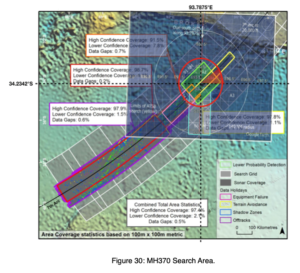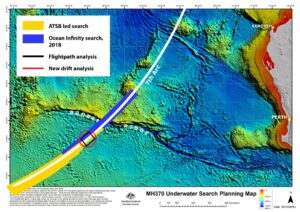 Aviation expert Geoffrey Thomas in Airline Ratings says that a new drift analysis conducted by one of the leading experts in the search for MH370 has found credible new evidence of the final resting place of the Boeing 777 and its 239 passengers and crew.
Aviation expert Geoffrey Thomas in Airline Ratings says that a new drift analysis conducted by one of the leading experts in the search for MH370 has found credible new evidence of the final resting place of the Boeing 777 and its 239 passengers and crew.
While MH370 disappeared on March 8, 2014, on an overnight flight from KL to Beijing, the new area, 1,960 km due west of Cape Leeuwin, Western Australia is in a location that has been partially searched before but is in very difficult terrain with the sea bed up to 5000m deep with high mountains, deep ravines and even volcanoes.
The drift analysis comes hard on the heels of an updated flight path analysis and both overlap building a compelling case to re-start the search, with the Malaysian Government and US undersea search specialists Ocean Infinity (OI) have previously stated that credible new evidence is required to re-start the search.
The report says the author of the new 126-page study MH370 Floating Debris – Drift Analysis is Richard Godfrey, an aerospace engineer who helped design part of the Space Station is a founding member of the Independent Group, a team of highly respected scientists and engineers who have helped lead the search for MH370 with their comprehensive satellite tracking analysis of the Boeing 777.

Speaking with Airlineratings.com Mr Godfrey said he, Would definitely describe the independent results of the Flight Path Analysis and the Drift Analysis as credible new evidence”, with Mr Godfrey having been assisted with his new paper with drift modelling from David Griffin at the CSIRO.
Almost half of the debris has been found by Blaine Gibson who also rallied others to look resulting in more finds, with Godfrey saying “Blaine has done some great work and all this drifts analysis would not have been possible without his efforts”.
Mr Godfrey says that of the 33 pieces of debris found which are confirmed or likely from MH370, 18 are statistically relevant for the drift modelling and those pieces confirm a common point of origin of 34.13°S ± 1.06° near the 7th Arc, which implies a crash location within 65 nm (120km) of the Last Estimated Position of the Boeing 777.
There have been nine drift analysis done on debris from MH370, by various teams in Australia, Germany, Italy, the USA and China and all point to a common location of between 28°S and 40°S with almost all having 34- 35°S as the centre-point.
“The Boeing end of flight simulations indicate, that following fuel exhaustion and the autopilot disengaging, that MH370 banked, phugoids developed and the aircraft spiralled down to crash at a point within 32 nm (60km) of the point of crossing the 7th Arc”, and “The 7th arc defines the possible positions of the last satellite communication from MH370 and extends between 8°S and 44°S”, and “The drift analysis independently confirms the same search area as the satellite data and fuel analysis,” Mr Godfrey said.

The report says the graphic shows in more detail the location of where the scientific community believe MH370 lies, with the red circle the drift analysis location.
Godfrey said that the original search conducted six years ago used the best equipment of the day for rapid deployment but since then technology has moved ahead dramatically, adding, “The Fugro and Phoenix International teams did an amazing job despite many times experiencing adverse weather but the main body of wreckage could have easily been missed despite the very best efforts in this search area” and “This is as difficult as it gets.”
He noted that a second search conducted by Ocean Infinity did touch on part of this area but at the time its new technology was still in a shakedown phase.
In January 2018, under contract with the Malaysian Government, Ocean Infinity undertook a 90-day survey campaign to find the wreckage that was extended out to 138 days.
That search was on a no find no fee basis and the same offer is still on the table for the Malaysians but so far they have said no to a new search.
Giving context to the advanced capabilities of the latest OI equipment it covered 125,000km2 in 138 days compared to 837 days for the previous search.
“OI’s technology has been refined and since that search, it has found several important ships and the Argentinian submarine ARA San Juan, lost in 2017,” Mr Godfrey said.
That submarine was found in a ravine in 920m of water, approximately 600 km east of ComodoroRivadavia in the Atlantic Ocean.
More recently OI has found the French submarine Minerve, which went missing in the Mediterranean in 1968.
Incredibly, because of its advanced technology, OI found the Minerve in just five days something multiple search teams have failed to do over the decades.
Mr Godfrey believes that US-based Ocean Infinity holds the key to finding MH370 and giving closure to the relatives of the 239 souls on board.
Those relatives have been tormented for years by endless and mostly farcical conspiracy theories perpetuated by some media outlets.
Over 130 books have been written about the disappearance of MH370.
Oliver Plunkett OI’s chief executive described OI’s involvement in the hunt for the missing jet to the BBC as “unfinished business”.
Mr Godfrey says what is needed is for OI to search the entire area again – including the original search and OI’s 2018 search – as well as the wider area that has been identified by the drift modelling.
This area would be about 200,000sq km, with the new drift analysis overlaps on work done independently by the highly respected Oceanographer Professor Charitha Pattiaratchi who is based at the University of Western Australia.
Prof. Pattiaratchi, who has been published in over 300 scientific journals tells Airlineratings.com that the “only tangible physical evidence that is available to date is the debris from the western Indian Ocean.”
“My definition of physical evidence is that something you could hold and touch,” Prof. Pattiaratchi said.
Prof. Pattiaratchi says that many pieces that have been discovered to date ,“have been proven by official sources from different countries to have originated from 9M-MRO (MH370’s registration).“
Prof Pattiaratchi supports a search between 32 and 34 degrees south and 70nm wide.
An edited report from Airline Ratings by John Alwyn-Jones
















